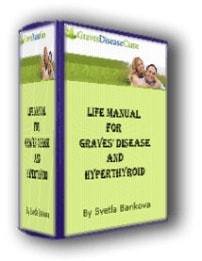 Overactive Thyroid Gland – Drama or Real Life Experience?
Overactive Thyroid Gland – Drama or Real Life Experience?
by Svetla Bankova
The Overactive Thyroid Gland (also known as hyperthyroidism) affects different people in different ways. Many experience weight loss (despite increased appetite), tiredness, nervous symptoms and a dislike of hot weather.
Shakiness of the hands and awareness of a rapid heart beat and difficulty sleeping are also common. Hyperthyroidism is a prolonged illness which, if untreated, can have severe consequences and the most dangerous of all- thyroid storm. However, overactive thyroid symptoms may wax and wane in an individual over a period of years and sometimes it is very difficult even to get diagnosed properly. How many times have you heard these words stated:

- ‘You’re just suffering from stress and anxiety’
- ‘It’s in your genes, learn to live with it’
- ‘Just snap out of it and get on with your life’
- ‘You are overreacting, be real’
- ‘You are too emotional, I can’t stand it’
- There’s nothing much you can do about it’
I’m sure you’ve heard these types of statements many times, from well meaning friends, relatives and even doctors. It can be very discouraging when those around you do not understand your physical and mental suffering. You may wish that they could live inside your body for just one day, and experience the symptoms you have to deal with constantly. Or may be you just have Overactive Thyroid (Hyperthyroidism) and you simply are not aware of that as well. In fact, one of the reasons for your overactive thyroid could be Graves’ Disease. Let’s have a look on your thyroid gland so you can better understand the origin of this disease.
Thyroid Gland in Simple English
round one in 20 people will experience some form of thyroid dysfunction in their lifetime. Women especially are more often affected than men and thyrotoxicosis may even appear for the first time three to six months after pregnancy (postpartum).
The thyroid gland is part of the endocrine system, which secretes regulatory hormones into the blood. The thyroid sits just below the Adam’s apple (larynx) and has two lobes, one on either side of the windpipe. This thyroid gland controls many vital metabolic processes, such as growth and energy expenditure.
The thyroid gland produces the hormones thyroxine (tetra-iodothyronine) and tri-iodothyronine, which set the body’s metabolic rate. The more of these hormones in the blood, the faster the metabolism. The hormones are referred to as T4 and T3 respectively, reflecting the number of iodine atoms in each hormone.
The pituitary gland in the brain regulates the production of the hormones by releasing a chemical called thyroid stimulating hormone (TSH). It is believed that the body needs about 150µg of iodine a day to allow the thyroid to make sufficient hormones.
We call overactive thyroid gland when it produces too much iodine or thyroid stimulating hormone.
Fight Overactive Thyroid with………. No- Activity..
- If you are working full time, if possible, switch to part time, or even take a leave of absence. It will speed up your healing process dramatically.
- Make your “Priority list”, Those are the top 5 things that are your priority. Stick with this list and don’t add anything else to your plate until you get better.
- Delegate, delegate, delegate! Delegate all things that could be delegated to family members, kids, friends and relatives. The fewer things you do, the better.
- Set up your personal time and guard this, as it is your biggest treasure. It’s up to you what you’ll do with this time.
- Find at least 2 things that you really enjoy doing (the more the better), movies, books, painting, knitting, dancing, or singing. Anything. Do as much as possible.
- Stop any activity that’s taking too much time, energy, or efforts and you can live without it.
- Laugh- and laugh again. The more the better. Use movies, funny books, comedies, be around friends or people that make you laugh.
- Getting enough sleep, no matter how, can change the way you view the world. It’s the first ‘must do’.
- Find what you like to do and do more of that. The sooner, the better.
- Take care of yourself, love yourself and be your best friend. You are the most important person in the world.
As a psychologist, I must say that improving your life style will dramatically improve your overall health situation and I would recommend to take the necessary steps before your disease become uncontrollable.
Diet also can contribute to your overactive thyroid gland. For more recommendations on diet, what to eat and what to avoid check here.
 To learn more methods for coping with your overactive thyroid, you may check my book “Life Manual for Graves’ Disease and Hyperthyroidism”.
To learn more methods for coping with your overactive thyroid, you may check my book “Life Manual for Graves’ Disease and Hyperthyroidism”.
